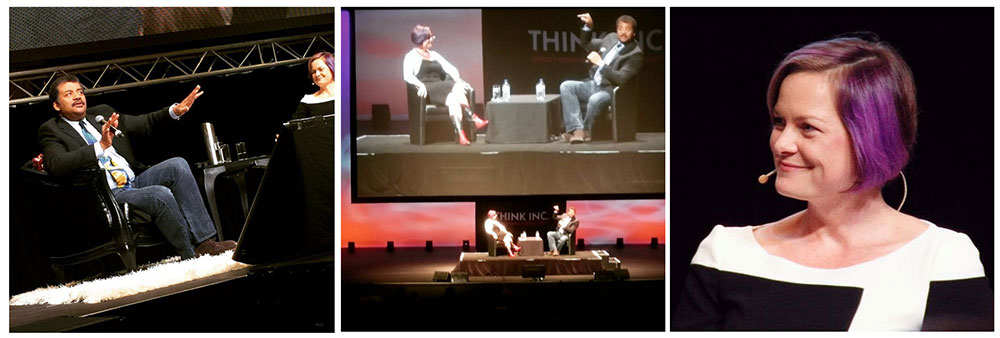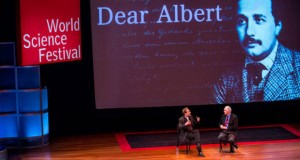There’s a supplementary video feature on the DVD of Cosmos: A Spacetime Odyssey where producer Seth MacFarlane (of Family Guy fame) talks about a childhood memory watching Sea Quest, a low budget tv show which had an unusual recurring character – a telepathic dolphin named Darwin.
MacFarlane postulates that its unlikely that the dolphin would keep the same name if the show were made today. That network executives would be concerned the name ‘Darwin’ would be a turn off for a certain portion of the audience. Somewhere in the last fifteen to twenty years, MacFarlane suggests that the American pop culture landscape became detached with the scientific community and slipped into a comfort zone pandering to the religious Right. Celebrating the scientific achievements of humankind and rebuilding an interest in space exploration became a significant motivating force for the modern incarnation of Comsos explained MacFarlane.
When the time came to choose a presenter for Cosmos, there was one clear choice. The Director of the Hayden Planetarium in the American Museum of Natural History – Neil deGrasse Tyson.
In the past ten years, Tyson has become an invaluable figurehead for the academic community in America. A passionate communicator and wonderful advocate for the scientific disciplines, Tyson has become a pop culture figure thanks to his infectious enthusiasm, his role in the controversial ‘delisting’ of Pluto as a planet and his media appearances in shows such as Comsos and The Big Bang Theory.
Think Inc – an Australian media company that bills itself as a ‘promoter of intellectual discourse’ – brought Tyson to Australia for a three city tour where he would participate in a two hour Q&A and field questions from both a host as well as the audience. I was fortunate enough to attend the event in Brisbane.
The evening was hosted by Amanda Bauer who I thought did an excellent job. Bauer is an astrophysicist in her own right and was as well versed on many of the topics discussed as the man himself. They talked dark matter, the age of planet Earth, studying the stars, the existence of multiverses and quantum theory.
It wasn’t all brain food however. Tyson kept the conversation light at times, talking about the notoriety he garnered amongst children when he was involved in the panel which had Pluto de-listed as a planet. “It’s the strangest thing receiving hate mail from eight year olds” cracked Tyson. “They would send drawings of Pluto shedding tears.”
Tyson also revisited the media attention he got when he critiqued the film Gravity on Twitter. He mocked a scene where Sandra Bullock tearfully farewells George Clooney by releasing a cable which sends him hurtling into the abyss. “All she had to do was gently tug on that wire and he would’ve been saved!”
He went on to say that he teased the film out of a sense of love (“I wouldn’t do that to a sci-fi film that didn’t earn it”) and when asked what his favourite science fiction films were he named The Matrix and Contact at the top of his list. Just don’t mention the Matrix sequels.
The audience at the Courier Mail Piazza deserve plenty of praise for their questions too. Tyson spoke with a large cross section of the audience – young and old, men and women, respectful academics and raving fan boys. When asked what would be the ‘coolest’ major scientific discovery in the foreseeable future, he told a young boy that it would be the prospect of discovering life on Mars. Particularly the notion of whether that organism would have DNA – the same building blocks of life as we have on Earth.
He was cautionary with a man who told him that Tyson’s explanation of the multiverse and dark matter was a ‘spiritually enlightening’ moment that helped him understand God. Where biologist Richard Dawkins has vociferously attacked religion on social media and become the archetypal ‘angry atheist’, Tyson prefers not to speak on those matters, respectful of others and their beliefs. He bemoaned the fact that he has ‘probably talked about religion publicly maybe once or twice’ but it comprises a disproportionate amount of the videos representing him online.
Should there be a greater emphasis on crewed flights or uncrewed flights exploring space? “Humans are fallible which is the best arguement for uncrewed space missions. If you put a person in a space shuttle, it limits where you can go because the person probably wants to come back. But there is something to be said for crewed flights which capture the imagination of the public and champion the human spirit.”
Seeing Tyson fielding the questions from the audience gives you an appreciation of how quick witted and whip smart the man is. He seems to have an endless grab bag of obscure scientific discoveries to share and colourful anecdotes that make the scientific community sound like the greatest thing to be a part of.
One of the closing questions from a fervent admirer went like this: “I am in awe of you Mr Tyson. But what are you in awe of?”
For the first time that evening, he paused for a moment while he considered his answer. I fully expected a gentle cop out. An acknowledgement of family or loved ones. A cliched answer but completely understandable. Instead, he spoke of smart phones and aeroplanes. Both are common pieces of technology in every day life. But he pulled apart the extraordinary scientific formulas and technological achievements that make them function. “Do you know when your iPhone tells you the time, it is synchronized with a satellite in space and the time lost in relaying that information out of orbit is factored into the reading on your phone by using a formula that calculates the elliptical orbit that the satellite travels upon?”
A clever anecdote about how we become accustomed to modern technology and how we should never take it for granted. “When the Egyptians stopped building the pyramids, the next time humankind built a taller structure was the Eiffel Tower nearly five thousand years later. Never stop being curious.”
 The FAT Website est. 1999
The FAT Website est. 1999









Sounded a great night mate.